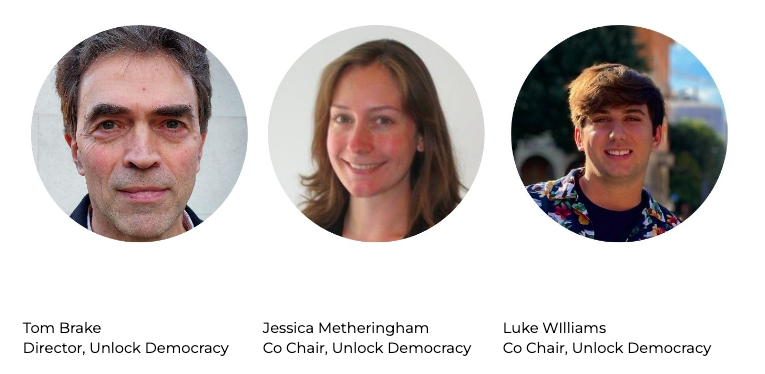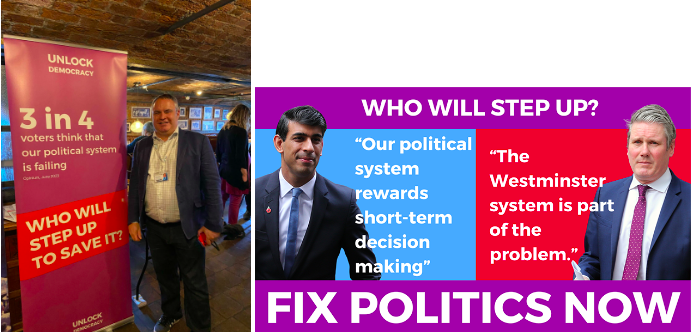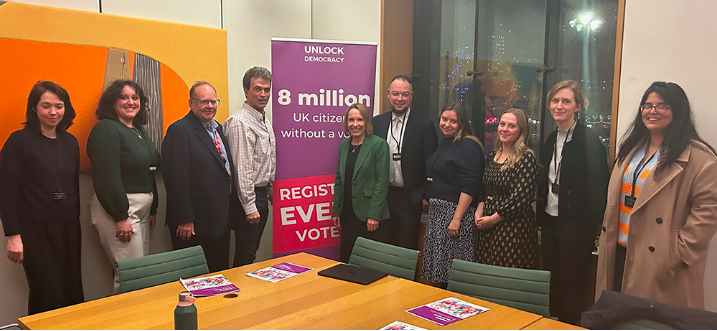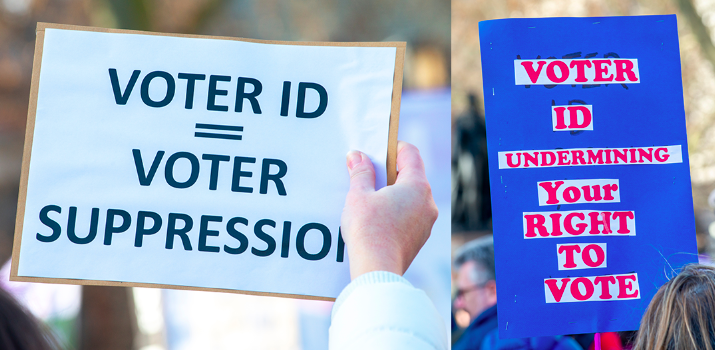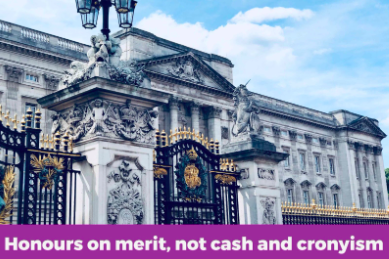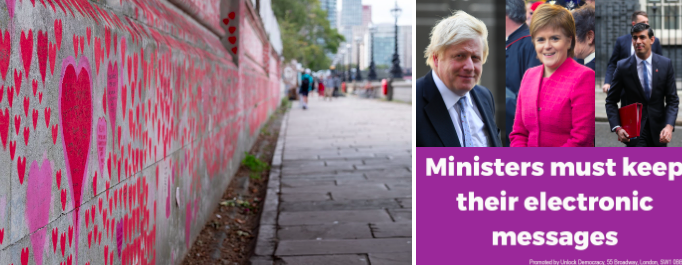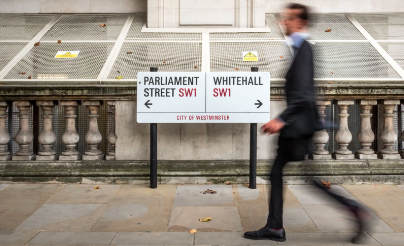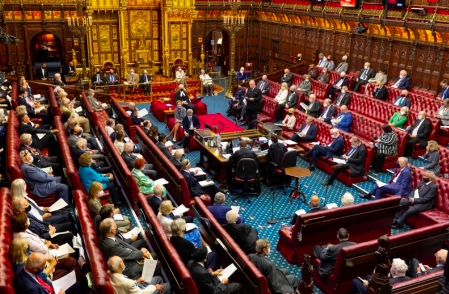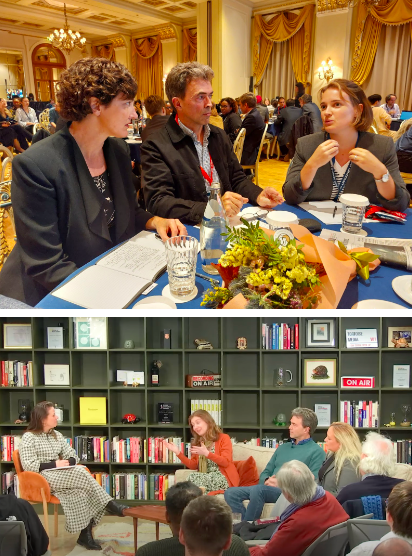Annual Report 2024
Joint Message from our Co Chairs and Director:
2024 is a big year for democracy, with billions of people voting in a series of elections around the world.
We haven’t been able to influence all of them, but thanks to our members, supporters, Council members and staff we’ve had an impact on the elections here in the UK.
All the major political parties backed democratic reform in their General Election manifestos, and there have been some big steps taken towards making elections fairer and more accessible in Wales. In Westminster, the new government has wasted no time in abolishing hereditary peers, and has committed to a number of other vital reforms.
Our annual report below sets out in much more detail how we’ve been driving change during the last 12 months.
Thank you for your ongoing support.
Best wishes,
Table of Contents
Campaigns
Fix Politics Now
The biggest focus of our campaigning activity this year was calling on all the major parties to adopt a comprehensive democratic reform agenda in their manifestos. Three quarters of voters say they think our political system is failing. We asked, who will step up to save it?
Trust in politics has been driven down to record lows by sleaze, cronyism, centralisation of power, and an electoral system where votes cast don’t match seats in the Commons.
That’s why we’re calling for urgent modernisation of our failing political system.
Our message made its way into most of the party manifestos at the 2024 General Election. The majority of parties, from all sides of the political spectrum, were in favour of:
Proportional representation for Westminster elections - unless we make the House of Commons representative of the country, little can change in our politics. Votes cast must match seats awarded.
An elected or part-elected House of Lords - hereditary peers and political donors and cronies have no role to play in a modern democracy, let alone have a chance to set our laws.
Move power out of Westminster to local communities - more decisions taken in town halls, not Whitehall. Give local people a chance to shape their communities and futures.
Clean up our politics - restrict second jobs for MPs, take big money out of our politics and make sure our politicians play by the same rules as the rest of us.
We also want to see a written constitution for the United Kingdom that enshrines our rights and freedoms in law. It will also set out the powers of central and devolved governments, so that these powers cannot be abused.
These reforms can transform how politics works and give us better governments that build a better society for everyone.
The new government has committed to a suite of political reforms, like modernisation of the House of Lords, and cleaning up our parliamentary standards system. This is a big win for our campaign.
Our priority now will be supporting the government in implementing the reforms it promised, and encouraging it to go further in key areas like electoral reform.
Register Every Voter
Our campaign to introduce a system of Automatic Voter Registration also took great strides forward this year, starting with the launch of our report Register Every Voter in parliament last autumn.
Another big breakthrough came when the Welsh Senedd announced an Automatic Voter Registration pilot as part of its Elections and Elected Bodies (Wales) Bill.
The new government in Westminster has also committed to bringing in AVR for the whole country. This is a huge win which, if implemented, will give a voice to millions of unregistered voters.
Scrap Voter ID
Official figures show that 1 in 25 voters do not have an eligible photo ID to vote in elections in England, Wales, and Scotland - that’s over 2 MILLION people who could be barred from polling stations.
That’s why we are sticking with our campaign to scrap Voter ID.
We’ve been lobbying parliamentarians, conducting research, and spreading the word about the need for ID in the build up to the local and general elections.
A new government is now installed, but we’ll keep calling for this anti-democratic obstacle, which makes it harder for millions to vote, to be completely scrapped.
Honours Based on Merit, Not Cronyism
It’s right that honours are given for outstanding achievements or service to the country.
But there’s also a dark side to our honours system - the rewards given to political donors, cronies and chums.
Far too often, Prime Ministers have used honours to reward their allies and party donors. This blatant cronyism damages the reputation of Parliament and corrodes the public’s trust in our politics.
That’s why we’re calling for all political honours to go through the same independent assessment process that normal honours go through.
15,000 people have signed our petition calling on the Prime Minister to update the honours system. We will continue to call on the new government to clean up this aspect of our politics.
What are They hiding?
Hearings for the Covid inquiry in the last 12 months have laid bare the way that Government by WhatsApp let Ministers sidestep scrutiny and accountability.
A former Prime Minister and Chancellor ‘lost’ electronic messages relevant to the Covid Inquiry. Another Minister lost his phone that may, or may not, have contained evidence vital to investigating fraud on Covid contracts.
But this problem is not exclusive to Westminster. Former First Minister of Scotland, Nicola Sturgeon, deleted all of her WhatsApp messages during the Covid-19 pandemic.
Properly saved WhatsApp messages could provide valuable transparency in government decision-making. Whilst these discussions might have taken place in-person in the past, the advantage now is that we can have recorded evidence.
We launched a petition calling on the government to bring the rules into the 21st century and make sure that Ministers keep hold of their electronic communications. Over 10,000 people have signed it so far.
We wrote to senior civil servant, Simon Case, to seek assurances that all ministers and civil servants would be instructed to keep hold of copies of electronic messages.
Finally, we submitted evidence to the Covid inquiry which will be considered as part of its findings and recommendations.
Think Tank Transparency
Think tanks are able to exert considerable political influence in the UK through their regular contact with senior decision makers, such as UK ministers, MPs and senior civil servants.
Think tanks and lobbying consultants engage in comparable tasks. The work of consultant lobbyists must be registered, whilst think tanks can participate in comparable activities without having to register.
While some think tanks are transparent about where their funding comes from, others are not as upfront about it. In fact, for some, it is impossible to find out who their big donors are, what their commercial interests are and whether they are based in the UK or abroad.
You can find out how Unlock Democracy’s transparency is ranked here: https://www.opendemocracy.net/en/who-funds-you/
We want the government to change the law to require think tanks to:
Reveal their sources of funding
Register as lobbyists if they receive more than a certain amount from a single source (we suggest £85,000) and promote to government ministers or officials policy ideas beneficial to that source.
This year we’ve been conducting research into the influence of Think Tanks and their funders, which is helping us to make the case for greater transparency and accountability.
Overseas Constituencies
All UK citizens living abroad can now vote (before, only those who have lived abroad for 15 years could vote), but they will find their voices muted by a weak system of representation in Westminster. They will be represented by the MP from their last place of residence in the UK (which they might have left over 30 or 40 years ago). The chances are that their MP will have had little experience of dealing with the issues citizens abroad regularly face. This means their issues are often not addressed, or only poorly addressed by their MP.
That’s why we’re campaigning to secure proper representation for British voters living abroad. With overseas constituencies (areas designated as a voting district for the representation of eligible UK citizens residing temporarily or permanently abroad), we can ensure UK citizens living abroad are properly represented by MPs whose bread and butter is dealing with the challenges UK residents abroad face.
We’re working alongside the New Europeans, and the British Overseas Voters Forum to make Overseas Constituencies a reality, and give a voice to all British voters abroad.
We also hosted an event with Alexandre Holroyd, then an MP in the French parliament representing French citizens living in Northern Europe. This event illustrated the many benefits of overseas constituencies.
Protect our Human Rights
We were also part of a coalition of organisations fighting against the government's illegal plan to deport asylum seekers to Rwanda. Scrapping the Rwanda Plan was one of the first acts of the new government, which we welcome.
Research
This year, we’ve published 3 powerful research papers which make a strong case for different types of democratic reform.
Register Every Voter
We believe that everybody with the right to vote should be able to vote.
It sounds simple, but right now there are around 6.5 million people (a figure recently revised by the Electoral Commission) who are missing out because they’re not on the electoral register.
We commissioned Professor Toby James to write a report laying out the size of the problem, and proposing a simple solution: Automatic Voter Registration (AVR).
The launch of this report kickstarted our campaign to Register Every Voter. That campaign is already starting to show signs of success. The current government committed to introducing AVR in their election manifesto, and the Welsh government is taking steps to start an AVR pilot.
You can read the full report here
Power to the People
We teamed up with Arianna Giovaninni and Jonathan S. Davies from De Montfort University to produce a new report on the sometimes baffling devolution landscape in England.
There is a growing consensus that English governance is over-centralised, and that more-or-less radical devolution is required. The election of a new government creates a unique opening and new impetus for a radical devolutionary settlement in England.
Radical devolution requires a radical approach and a comprehensive, coherent and irreversible plan for reform. It must be developed by the centre in partnership with local leaders and communities, and not solely as another top-down project.
This report, published by Unlock Democracy in collaboration with Compass, assesses five proposals that could provide inspiration and guidance for an incoming government, if it is determined to act. The report concludes with its own set of recommendations inspired by these proposals.
The State of the House of Lords: Falling Backwards on Gender Diversity?
We revealed that far more men than women have been appointed to the Lords in every decade since the Life Peerages Act was passed.
Our work was covered in The Guardian, and helped drive the need for urgent reform of the Lords up the political agenda.
Events
It’s been another jam-packed year of events. Some highlights include:
Hosting panels at most of the major party conferences.
Our Director Tom Brake at the Lib Dem conference.
Tom speaking at the Athens Democracy Forum on the topic, ‘Making Democracies More Resilient”, and later in the year taking part in an event for Tortoise Media “The Voters’ Chessboard: Whose vote counts?”
In the middle of the General Election campaign, Sir John Curtice joined us for a discussion about what the polls were saying, and predicted - rightly - that the General Election result could lead to one of the most disproportionate parliaments ever.
Femi Oluwole and Frances Crick came to our AGM to speak on the Future of Democracy.
We’ve also had a book launch from New Economics Foundation CEO Danny Sriskandarajah, a panel discussion on AI and democracy, a discussion about how well UK democracy services ethnic minorities, and an explainer on the process of writing a constitution with experts from Chile and Ecuador.
Finances
We are enormously grateful to everyone who has contributed financially to Unlock Democracy.
Your membership fees and donations amount to £165,505 for the financial year 2023/24 and are key to keeping us running as an independent voice for democracy.
Unlock Democracy is also supported by income from our subsidiary property company, Rodell Properties. Rodell owns and manages two properties in Central London.
Trusts and Individual Donors
We are very grateful to the trusts and grant funders who provide support for specific projects. We’d particularly like to thank the Joseph Rowntree Reform Trust for their generous support for our work.
Legacies
Sometimes our supporters choose to remember Unlock Democracy in their will. This is a particularly meaningful way to help in the fight for our democracy, and to protect it for future generations.
This year, we received a generous legacy donation which has boosted our campaigning on the drive for political parties to embrace democratic reforms in their manifestos.
Full Financial Report
The full, audited accounts for Unlock Democracy’s financial year 2023-2024 will be available in November 2024, in an independent report by our auditors.
You can find Unlock Democracy on Companies House here.
New Council and Management Board
In 2024, Unlock Democracy members elected a new Council to oversee the organisation for the next 2 years, with Luke Williams and Jess Metheringham elected as our Co chairs!
Welcome to Richard Wood, Sam Wheeler, Rebecca Warren, Ian Driver, Lee Jasper, Luke Williams, Chante O’Shaughnessy, David Schley, Jessica Metheringham, Catherine Bearder, Stephen Carter, Stephen Gosling, Stuart Hill, Deborah Manzoori, Mary Southcott, and Vicky Seddon.
Press Mentions
We continued to raise our profile in the press this year, with a number of great features.
The press regularly calls on us for comment on democracy issues, like voter ID, automatic voter registration, honours, electoral and Lords reform, standards in public life, democratic integrity and think tank transparency.
Letters from director Tom Brake are regularly featured in The Times and The Guardian.
Members of the team made the case for democratic reform on Sky News, Al Jazeera, GB News, Talk TV, LBC, Times Radio, BBC5 Live, the Byline Times podcast, and across BBC local radio.
We also landed stories around our main campaigns in major press outlets like:
The Guardian, who covered our report into the gender balance of the House of Lords and the launch of Power to the People, our report on English devolution.
The Mirror, who covered our work on Automatic Voter Registration.
We worked with Politics Home to sound the alarm on people voting by post losing their vote because of delivery delays.
Our polling on democratic reform was also covered in Byline Times, and our campaign on Overseas Constituencies made it into the New European.
Staff and Interns
Unlock Democracy’s hard-working and experienced staff team was joined this year by a string of excellent interns and work experience students.
Thanks to Nathaniel, Anika, Nathan F, Jackson, Louis, Alexia, Ben, Barnaby, Nathan C, and Imani for all their hard work.

